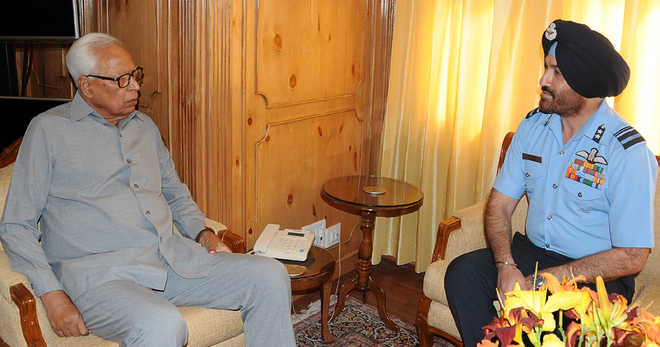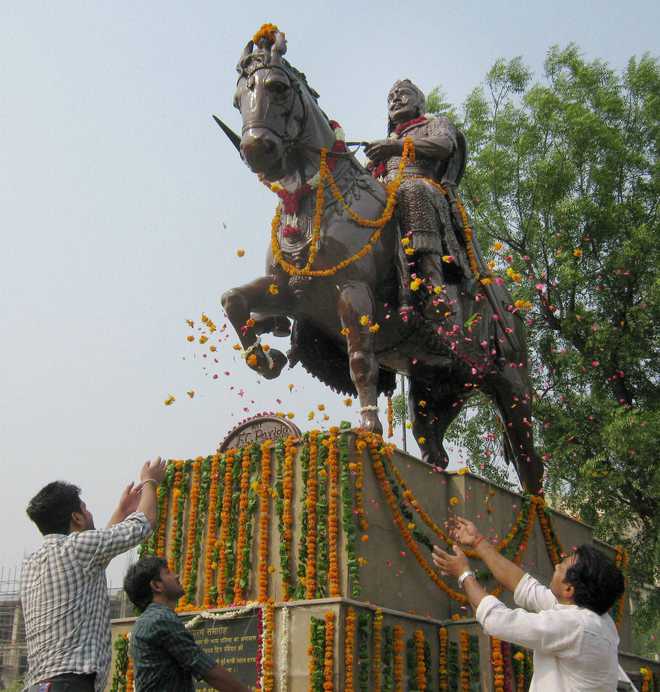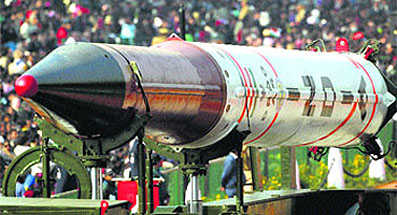
Having spent many years in Kashmir in various capacities in the hinterland from Avantipur and Srinagar to the LoC at Uri I never the enjoyed the Valley the way I did as a child in 1956.
With my parents at Jammu’s Damana Cantt that year, we drove to Srinagar the only way then known, a public transport bus. Staying at the un-walled Badami Bagh, the delight was in the evening walks to Adoos whose cold coffee still lingers in my taste buds. The boulevard – that is what I presume it was – was awake till late and life was a breeze. The shikarawalas sang songs while paddling their oars; and there was cinema and salted peanuts just like at any other hill station. I never went back to that Kashmir again except very briefly.
Today, after 26 years of internal turbulence, the search for happiness in Kashmir ends very early. In fact it hardly begins. Unless you are booked at the high-end hotels like Lalit Grand or Taj Vivanta, cocooned in the hillsides of the Zabarwan and enjoying only the weather and the view and nothing much beyond. Within Srinagar, the unpredictable law and order situation is a fun-spoiler. Reaching the traditional tourist spots of Gulmarg and Pahalgam too is fraught with unpredictability because some anti-terror operation may be on or an ambush could have taken place on a BSF bus. If you manage to stay at an Army facility, the checking and the curfew timings for entry and exit will upset you no end.
Many who are stakeholders in Kashmir’s return to peace like to evaluate their own parameters on what peace means. Some prefer the term normalcy to the rather utopian sounding ‘peace’ because they do not think Kashmir was ever at war, or remains in any form of conflict. No need to debate the semantics because most of us would agree that much of J&K has not been normal for the last twenty six years or so. Many of us in the Army do feel that we have been in a war-like situation for all these years. The term is ‘proxy war’ and I too have been brought up on this belief which I still hold dear.
For a tourist, the understanding of normalcy would probably dwell on predictability; the ability to enjoy the Valley’s serene beauty in the company of loved ones, away from the din of Delhi and Gurgaon, without having to be confronted with shut-downs (bandhs) or cancellation of flights. Gulmarg and Pahalgam, Srinagar’s boulevard or the Nagin houseboats can’t be enjoyed if one has to keep Plan B, C and D ready to escape awkward situations.
For a taxi driver, tourist operator or restaurant owner normalcy means tourists around the year and not restricted to the season. Tourists are carefree people. They like to do things they would normally not do while at their home stations. They like to take walks at awkward times, sit beside the lake and croon a few numbers, sip coffee at midnight in a brightly-lit coffee shop or eat aloo paranthas at 2 AM; some would love to even take in a cheap-thrill Bollywood movie, something they wouldn’t touch with a bargepole otherwise. Unfortunately, the proxy war has taken out the characteristic fun of a hill station. Forget tourists, it is usually difficult to find a smiling face in the local crowds. Happiness seems to be eluding its people and the new generation used to the gun-and-checkpoint culture is brooding in this unhappiness.
I do remember that on February 6, 2011 a young man in Maidan Tsogul near Handwara lost his life because he preferred to run when challenged by an Army ambush at 9.30 PM instead of stopping and identifying himself. It was a regretful case because all that the young man was doing was meeting his sweetheart in an orchard; a huge risk no doubt, given the environment. Where should young people meet and express love in a world today in which awareness is unbounded due to social media and the Net.
The awkwardness which prevails in the psyche of the young Kashmiri today is that he is technically modern, with access to information from all over the world. He is not necessarily radicalised as many would be wont to thinking. However, how does the modernity of outlook take shape? There are no outlets for entertainment, no burger joints which are open in the evenings and no coffee shops – the natural outlets for steam within the coffee and within the hearts. During the infamous Emergency of 1975-77, one of the first casualties was Delhi’s iconic Coffee House at the place where the run-down Palika Bazaar stands today. It was the place where intellectuals sat and let out all their steam against the system, the government and against probably God himself. It was Delhi’s happening place which gave much happiness to people until it was torn down. If Kashmir needs an outlet to vent frustration of the people, it is coffee, tea and kahwa which must find place in its landscape at ‘nukkads’ and at Residency Road. I now hear something like this is emerging, not in a transformative but in a slow way. The emboldening entertainment from stone-throwing can then perhaps be stopped.
Mercifully, one does hear of an odd seminar being organized at Srinagar but the feelings are yet tentative and hesitant. Many an expert is consulted about the safety of organizing these. The wonderful facility of the Sher-e-Kashmir International Convention Centre (SKICC) must unhesitatingly host events of a cosmopolitan nature, protests from the separatists notwithstanding. Some years ago Delhi’s outstanding choir, the Capital City Minstrels, were invited by the then-Chief Minister to perform at Gulmarg and the SKICC. The event was so poorly advertised that only a few rows could be filled, and Maxell Pereira and his excellent choir could hardly find appreciation. The German Ambassador to India organized the Zubin Mehta concert at the Nishat Garden a few years ago but the Separatists got the better of the event by organizing their parallel event based on the misplaced notion that local music and song were being endangered. Speak to former Governor SK Sinha and he will tell you of the show by the Pakistani rock group Junoon on the banks of the Dal Lake, and how it was appreciated by the young public of Srinagar and other towns.
The Sher-e-Kashmir International Convention Centre must be used to organize world-class conferences at Srinagar to bring it on the international map of intellectual activities.
Kashmir’s youth needs to get out of the well in which has been been stuck. Frustration is rife, when information of the world is at your fingertips but the occasion and opportunity eludes you. Many believe and preach that cosmopolitanism is against the tenets of Islam. Yet, nowhere does Islam ban entertainment. A casual search of the Net reveals the existence of cinemas in Tehran, Dubai, Djakarta and Kuala Lumpur. Indeed they do in Pakistan too. Is there any reason why cinema should not return to Kashmir? All these cities, where people adhere to the Islamic faith, are rich in café culture contributing to the basic desire of their nationals to do what most human beings do; go out as families or with friends and sit around a table of food or steaming cups of some beverage or the other.
Good weather in Kashmir, especially around the spring season can see hundreds of families with their picnic baskets descending on picnic spots. The desire for fun and togetherness in outings is inherently there in every Kashmiri; and the ‘mehmendari’ they are used to, can even give some good Punjabis a run for their money. When a people have an unnatural environment which stymies their natural social psyche, the effect is even more frustrating.
So even as security agencies debate parameters of normalcy by comparing figures of grenade blasts and terror acts, they need to realise that security considerations go beyond physical limits. To secure a people you also need to create and promote an environment of happiness for them to thrive in. Nothing artificial; just see the desire of the people and combine what comes naturally to them from their roots. Don’t ever mar the happiness in families, for if you do so the memories would be difficult to detach.
Given the temper and anger in the streets, and the increasing tendency on the part of the public to come to the assistance of the terrorists once encounters begin, this advice will be criticised. But we seem to be hugely short on ideas on how to change the tempo in the Valley. We cannot await the end of street confrontation to commence initiatives towards changing the narrative, and we cannot be held hostage by Separatists who wish to play the religious card and keep a society from progressing. It’s a a difficult task for the government of the day: to change the concept of governance from the simple ‘roti, kapda, sadak, makan’ to something more transformational which will usher more happiness among the common people.
For the professional security provider, and for the political leadership perhaps, here is food for thought. The attempts to establish normalcy in Kashmir must have a concept that is commonly understood by both. Discussing this in only Unified Command Meetings is not going to evolve narratives that are well-understood. It has to be through brainstorming at the highest level and frequent meetings between the core agencies. As prime professionals in the game of counter-violence, perhaps the Army needs to take this more professionally, war-gaming it at all its premier institutions and giving the Nation the results of all its nurtured military intellect.




































































